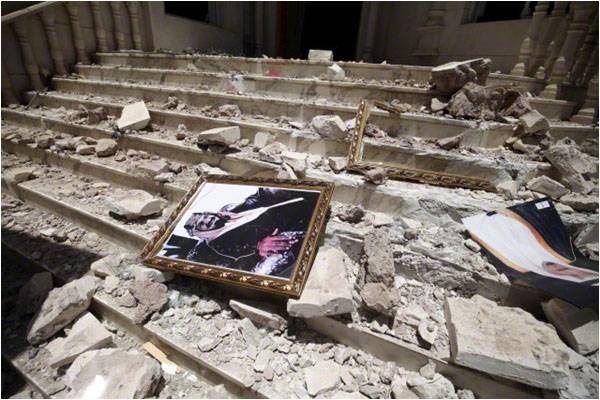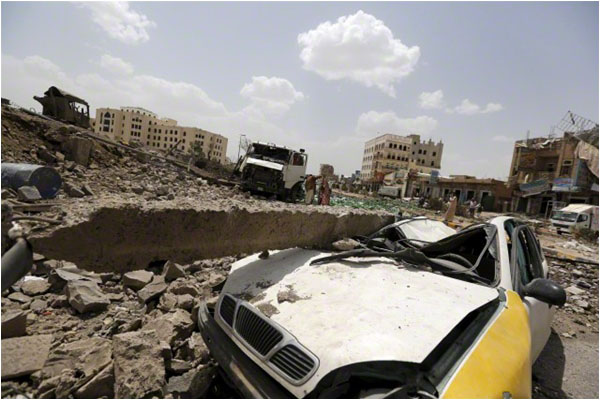
‘Endgame’ may be too dramatic a term, but it cannot be denied that the kingdom of Saudi Arabia is in deep trouble.
It has been in obvious trouble eversince the late King Abdullah returned from convalescence in Europe in February 2011 and rained $135 billion on Saudi citizens to opiate them against the sort of uprisings that toppled his friends Hosni Mubarak and Zine El Abidine Ben Ali in Cairo and Tunis respectively. He swore monarchies and Sheikhdoms would not be allowed to fall.
Saudis have had a knack of externalizing internal upheaval. The siege of Mecca by anti-monarchy Muslim Brotherhood extremists in 1979, almost at the same time as the coming to power of the Ayatullahs in Tehran, was shrouded in a news blackout. In fact an impression was created that Iran may have been involved in the Mecca siege. The remarkable story of US Special Forces, converting temporarily to Islam to be able to enter Islam’s holiest mosque to flush out the militants, was kept away from the American public. I would give my last penny for a photograph or TV footage of US officers reciting the “Kalma” in their line of duty. If the Saudis could buy news blackouts to hide such sensational stories, the basement level Saudi restiveness in the wake of the Arab Spring was much easier to conceal.
Whatever dissatisfaction there was within the Kingdom was soon directed towards the Syrian and Libyan operations. Saudi Arabia was in the vanguard in both theatres. I was witness to the artificial manufacture of civil war. At one stage Lakhdar Brahimi the UN Special Representative in Syria, counted sixty four opposition groups hatching separate plots to topple Bashar al Assad. The idea was to wrench Syria away from the Iran, Syria, Hezbollah, Hamas axis, a longstanding dream of US neo cons, Israel and Saudi Arabia.
The departure of Hillary Clinton from the State Department and the appointment of John Kerry, relieved pressure on Damascus because the Nuclear File with Tehran picked up in acceleration. If Tehran was kosher with the West, Assad now had a double protection – from Moscow as well as from Tehran.
Riyadh and Jerusalem were in deep despair. An expression of this despair was Saudi Security Chief, Prince Bandar bin Sultan’s extraordinary meeting with President Putin in the Kremlin. Saudi would give Russia the moon and protect forthcoming Winter Olympics in Sochi if Russia helped them topple Assad.
This remarkable admission of Saudi control (influence) over terrorism in the Caucasus may be hyperbole. But after Abu Bakr al-Baghdadi’s ISIS took control of Mosul in June 2014, President Obama explained the delay in bombing and retarding Daesh advance towards Baghdad similarly. If the ISIS was checked, he said, pressure on Iraqi Prime Minister, Nouri al Maliki to vacate his seat would lessen. Washington’s priority was to see the back of Maliki whose allegedly pro Shia policies were the primary reason for Sunni resentment which expressed itself in the burgeoning ISIS. In other words, ISIS was allowed to grow to help remove Maliki. To that extent it was an asset.
In any case, the ISIS was an amalgam of three broad streams – Muslim Brotherhood, Jabhat al Nusra (an Al Qaeda off shoot) and the former Baath elements in their new avatar as anti West Sunnis. All three streams have received Saudi help to fight Assad, even though each is separately anathema to Riyadh.
Soon enough, Saudis were to start paying a heavy price for having helped create a monster. The Kingdom’s Northern Border with Iraq was breached by Islamic State elements in December 2014. Saudi General Oudah al Belawi was killed. The success of the operation was explained on “inside” help.
After King Abdullah’s death in January 2015, the mentally ailing king Salman bin Abdulaziz has been surrounded by a brash, young royal leadership among whom the King’s 29 year old son, Deputy Crown Prince, Mohammad bin Sultan is calling most of the shots. A 100 year old system built on consensus among the sons of the Kingdom’s founder, Abdulaziz Ibn Saud, must resent the new usurpation of power.

The new princes have upturned the late King’s cautious policies, and entered into a war in Yemen which they do not know how to end.
Frenetic diplomatic activity in the region is neither able to end the war in Yemen nor eliminate the Islamic State in Syria because of Riyadh’s obstinacy
Riyadh must have victory in Yemen which means the restoration of Abd Rabbuh Mansur Hadi, now an exile in Saudi Arabia, to the Presidential palace in Sanaa. Imagine the idea – a person who invited Saudi military intervention, which has all but destroyed Yemen, to rule Yemen as the people’s leader!
The young prince also wants Assad to go before he endorses any settlement in Syria or final action against ISIS. Riyadh has another condition: in both instances they insist in Iran being chastised for helping the Houthis in Yemen and Assad in Syria. This is the most difficult condition to fulfill. How does the international community vouch to terminate Iran’s “moral” support in both instances? The original sins of supporting anti Assad extremism in Syria and declaring war on Yemen lie at Saudi door. Saudis want Iran to be yoked with them in comparable guilt. This is Shia-Sunni parity being carried to absurd lengths.
In a state of funk, the young leaders are cosying upto the Muslim Brotherhood and the al Qaeda at the same time.
While the White House is under pressure from the US Congress on the Iran nuclear deal, and Iran is readying itself for two elections – to the House of Elders and the Majlis – Riyadh imagines it has some room for maneuver.
This game will in all likelihood be over early next year. What hand will Riyadh be left to play with then?
The author is a veteran journalist from New Delhi
It has been in obvious trouble eversince the late King Abdullah returned from convalescence in Europe in February 2011 and rained $135 billion on Saudi citizens to opiate them against the sort of uprisings that toppled his friends Hosni Mubarak and Zine El Abidine Ben Ali in Cairo and Tunis respectively. He swore monarchies and Sheikhdoms would not be allowed to fall.
Saudis have had a knack of externalizing internal upheaval. The siege of Mecca by anti-monarchy Muslim Brotherhood extremists in 1979, almost at the same time as the coming to power of the Ayatullahs in Tehran, was shrouded in a news blackout. In fact an impression was created that Iran may have been involved in the Mecca siege. The remarkable story of US Special Forces, converting temporarily to Islam to be able to enter Islam’s holiest mosque to flush out the militants, was kept away from the American public. I would give my last penny for a photograph or TV footage of US officers reciting the “Kalma” in their line of duty. If the Saudis could buy news blackouts to hide such sensational stories, the basement level Saudi restiveness in the wake of the Arab Spring was much easier to conceal.
Whatever dissatisfaction there was within the Kingdom was soon directed towards the Syrian and Libyan operations. Saudi Arabia was in the vanguard in both theatres. I was witness to the artificial manufacture of civil war. At one stage Lakhdar Brahimi the UN Special Representative in Syria, counted sixty four opposition groups hatching separate plots to topple Bashar al Assad. The idea was to wrench Syria away from the Iran, Syria, Hezbollah, Hamas axis, a longstanding dream of US neo cons, Israel and Saudi Arabia.
The departure of Hillary Clinton from the State Department and the appointment of John Kerry, relieved pressure on Damascus because the Nuclear File with Tehran picked up in acceleration. If Tehran was kosher with the West, Assad now had a double protection – from Moscow as well as from Tehran.
The original sins of supporting anti Assad extremism in Syria and declaring war on Yemen lie at Saudi door
Riyadh and Jerusalem were in deep despair. An expression of this despair was Saudi Security Chief, Prince Bandar bin Sultan’s extraordinary meeting with President Putin in the Kremlin. Saudi would give Russia the moon and protect forthcoming Winter Olympics in Sochi if Russia helped them topple Assad.
This remarkable admission of Saudi control (influence) over terrorism in the Caucasus may be hyperbole. But after Abu Bakr al-Baghdadi’s ISIS took control of Mosul in June 2014, President Obama explained the delay in bombing and retarding Daesh advance towards Baghdad similarly. If the ISIS was checked, he said, pressure on Iraqi Prime Minister, Nouri al Maliki to vacate his seat would lessen. Washington’s priority was to see the back of Maliki whose allegedly pro Shia policies were the primary reason for Sunni resentment which expressed itself in the burgeoning ISIS. In other words, ISIS was allowed to grow to help remove Maliki. To that extent it was an asset.
In any case, the ISIS was an amalgam of three broad streams – Muslim Brotherhood, Jabhat al Nusra (an Al Qaeda off shoot) and the former Baath elements in their new avatar as anti West Sunnis. All three streams have received Saudi help to fight Assad, even though each is separately anathema to Riyadh.
Soon enough, Saudis were to start paying a heavy price for having helped create a monster. The Kingdom’s Northern Border with Iraq was breached by Islamic State elements in December 2014. Saudi General Oudah al Belawi was killed. The success of the operation was explained on “inside” help.
After King Abdullah’s death in January 2015, the mentally ailing king Salman bin Abdulaziz has been surrounded by a brash, young royal leadership among whom the King’s 29 year old son, Deputy Crown Prince, Mohammad bin Sultan is calling most of the shots. A 100 year old system built on consensus among the sons of the Kingdom’s founder, Abdulaziz Ibn Saud, must resent the new usurpation of power.

The new princes have upturned the late King’s cautious policies, and entered into a war in Yemen which they do not know how to end.
Frenetic diplomatic activity in the region is neither able to end the war in Yemen nor eliminate the Islamic State in Syria because of Riyadh’s obstinacy
Riyadh must have victory in Yemen which means the restoration of Abd Rabbuh Mansur Hadi, now an exile in Saudi Arabia, to the Presidential palace in Sanaa. Imagine the idea – a person who invited Saudi military intervention, which has all but destroyed Yemen, to rule Yemen as the people’s leader!
The young prince also wants Assad to go before he endorses any settlement in Syria or final action against ISIS. Riyadh has another condition: in both instances they insist in Iran being chastised for helping the Houthis in Yemen and Assad in Syria. This is the most difficult condition to fulfill. How does the international community vouch to terminate Iran’s “moral” support in both instances? The original sins of supporting anti Assad extremism in Syria and declaring war on Yemen lie at Saudi door. Saudis want Iran to be yoked with them in comparable guilt. This is Shia-Sunni parity being carried to absurd lengths.
In a state of funk, the young leaders are cosying upto the Muslim Brotherhood and the al Qaeda at the same time.
While the White House is under pressure from the US Congress on the Iran nuclear deal, and Iran is readying itself for two elections – to the House of Elders and the Majlis – Riyadh imagines it has some room for maneuver.
This game will in all likelihood be over early next year. What hand will Riyadh be left to play with then?
The author is a veteran journalist from New Delhi

